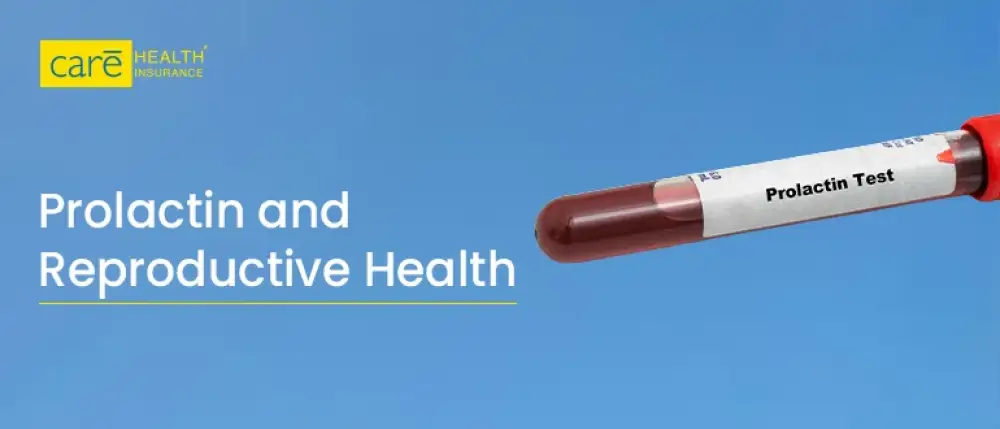Hormones act as the body's chemical messengers, affecting everything from mood to metabolism. Among them, prolactin affects both women’s and men’s health. While it is primarily associated with milk production (lactation) after childbirth, its functions extend beyond that. It plays a vital role in reproductive health, hormonal imbalance, immune function and even overall well-being.
Maintaining optimal levels of this hormone is essential as both high and low levels of prolactin can lead to issues such as irregular menstrual cycles, sexual dysfunction or infertility. In this blog, we’ll learn about prolactin, its functions, normal prolactin levels, the causes of imbalance, symptoms of prolactin imbalance, and available treatments.
What is Prolactin?
Prolactin is a hormone produced by the pituitary gland ( a small pea-sized gland located at the base of your brain). It is responsible for reproductive health, especially in women, where it stimulates milk production(lactation) after childbirth.
During pregnancy, the body naturally increases prolactin levels. This helps prepare breast tissue for milk secretion. In men, it helps in maintaining testosterone levels and inducing sperm production. For better clarity, let’s discuss the functions of prolactin in detail.
Functions of Prolactin in the Body
Prolactin functions differently in women and men. In women, it works alongside estrogen and progesterone to prepare the breasts for breastfeeding during pregnancy. It promotes the growth of mammary glands and the development of milk-producing tissues.
After childbirth, it triggers lactation in the mammary glands. Additionally, it helps regulate reproductive hormones, particularly estrogen and progesterone. This indirectly helps in maintaining good reproductive health. Whereas in males, it helps regulate testosterone levels, supports sperm production, and promotes proper immune function.
Normal Prolactin Levels
Understanding normal prolactin levels is essential for recognising when prolactin becomes out of balance. Below is the normal range in men and women :
- Women: below 25 ng/mL
- Men : 3 to 15 ng/mL
- Pregnant Women: Levels can be significantly higher and exceed the normal range with the progression of pregnancy
- Postmenopausal Women: Levels drastically decrease and are lower than those of premenopausal women.
What Causes Prolactin Imbalance?
Both high and low levels of prolactin are harmful and have different causes. Let’s know about each of them for better understanding:
Causes of Low Levels of Prolactin
- Sheehan’s syndrome: A Condition affecting the ability to breastfeed.
- Smoking: Nicotine present in cigarettes is proven to affect the production of prolactin in women after childbirth.
- Retained placental fragments: These are small pieces of the placenta that remain inside the uterus after childbirth, miscarriage, or abortion.
Causes of High Levels of Prolactin
- Prolactinoma: A tumour or non-cancerous growth in the pituitary gland can induce high levels of prolactin.
- Birth control pills
- Nipple stimulation
- Antidepressants, blood pressure or psychosis medicine
- Certain herbs, including fennel seeds, red clover and fenugreek
- Irritation of the chest wall
- Hyperthyroidism or underactive thyroid
Common Symptoms of Prolactin Imbalance
Symptoms of prolactin imbalance vary in women and men. In women, they show up as infertility, irregular or absent menstruation, milky nipple discharge, vaginal dryness or pain during intercourse, reduced sex drive, acne or excessive hair growth.
Whereas, in men, the most common symptoms of prolactin imbalance include erectile dysfunction, enlarged breast tissue (gynecomastia) and decreased facial and body hair. Additionally, specific symptoms affecting both women and men include headaches, bone density loss, visual disturbances, and galactorrhea (inappropriate lactation).
Treatment and Management of Prolactin Imbalance
With a moderate lifestyle and medical and dietary changes, it is possible to reduce prolactin imbalance. Here are the most recommended remedies:
Stress Management
Under stress, cortisol levels rise, leading to a prolactin imbalance. Therefore, practising stress management techniques such as yoga, meditation, and deep breathing helps balance prolactin levels by reducing cortisol and increasing dopamine, which together regulate prolactin secretion.
Balanced Diet
Focus on eating nutritious foods and avoiding processed items. Some key recommendations include eating foods rich in vitamin B6 (bananas, leafy greens), antioxidants (vegetables, berries), and zinc-rich foods (seeds, nuts, and legumes).
Herbal Remedies
Some herbs recommended for regulating prolactin imbalance include chamomile, fennel seeds, red clover, fenugreek, Mucuna pruriens, and Vitex agnus-castus. These herbal remedies help balance prolactin by supporting the pituitary gland and regulating hormone levels.
Regular Exercise
Staying fit is one of the best ways to avoid hormonal imbalances, and what better way to do so than to exercise regularly? Performing moderate exercise, such as walking, swimming, or cycling, for 30 minutes daily helps lower cortisol levels. It also supports dopamine function, allowing the pituitary gland to regulate prolactin secretion.
When to See a Doctor?
Symptoms of hyperprolactinemia (high prolactin levels) or hypoprolactinemia (low prolactin levels) show up differently in women and men. In women, the symptoms include irregular periods, infertility, painful intercourse, low sex drive, and inappropriate milk production (galactorrhea).
On the other hand, symptoms in men include infertility, erectile dysfunction, reduced facial and body hair and lower sex drive. If these symptoms persist and are accompanied by headaches, nausea or vomiting and sudden changes and loss in vision, you must consult a doctor without further delay.
Maintaining Hormonal Balance for Better Health
Prolactin plays a crucial role in essential functions in both genders. However, when its levels become imbalanced- either too low or too high- it leads to numerous health concerns such as irregular periods, infertility, or sexual dysfunction.
Practising stress management techniques, following a balanced diet, exercising regularly and using herbal remedies can help keep prolactin levels in check. Still, if the symptoms persist, consult a doctor for proper treatment.
Seeking medical treatment without health insurance can be expensive. With Care Health Insurance’s health plan, you get covered for four consultations with gynaecologists and other specialists under Care OPD. This will not only reduce out-of-pocket expenses but also ensure timely care for better hormone health.
Disclaimer: The above information is for reference purposes only. The health insurance benefits are subject to policy terms and conditions. Refer to your policy documents for more details.
